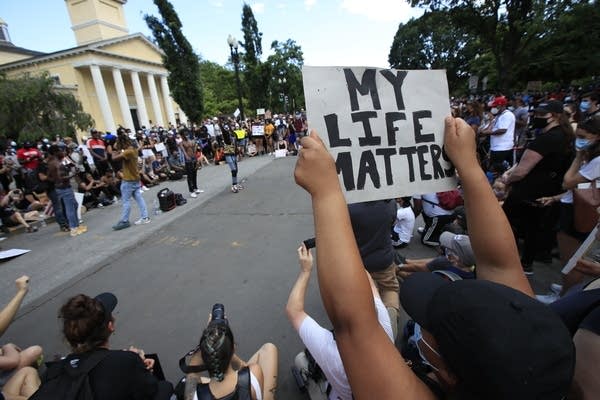For black climate expert, fight is against 'two inhospitable climates'

Go Deeper.
Create an account or log in to save stories.
Like this?
Thanks for liking this story! We have added it to a list of your favorite stories.
As people took to the streets to express anger and grief over the police killing of George Floyd last month, staff from the environmental nonprofit MN350 did, too. They volunteered as medics, distributed food and helped communities develop safety plans as the sometimes violent unrest edged into residential neighborhoods.
Executive director Sam Grant said the work was in lockstep with the organization’s mission.

“There is not this separation between people and planet that we have constructed in the mainstream environmental movement. People are a part of nature,” he told Climate Cast host Paul Huttner. “So when human beings are hurt, it’s just as important as deforesting an important forest ecosystem or causing massive pollution in a water ecosystem.”
“When we have massive examples of injustice, such as the murder of George Floyd by the police, we feel like it’s necessary for us to show up in force in those moments,” Grant said.
Turn Up Your Support
MPR News helps you turn down the noise and build shared understanding. Turn up your support for this public resource and keep trusted journalism accessible to all.
He said the fight for racial justice and climate justice should go hand in hand. He pointed out that communities of color in the Twin Cities face disproportionate health impacts and higher utility bills because of the urban heat island affect. That’s when human activity and often a lack of trees cause urban areas to be warmer than nearby suburbs and rural communities.
Grant also said winds from the south, airflow disruptions by downtown high-rises and a concentration of industrial development causes polluted air to settled over the predominantly black neighborhoods of north Minneapolis, causing a disproportionate rate of asthma.
“Black lives are impacted by two inhospitable climates,” Grant said. “We have the inhospitable climate of structural racism, which joins with the inhospitable climate generated by climate injustice.”
Grant said city and state climate solutions need to be centered in climate justice for all communities, and even actively dismantle injustice through green jobs and community investments. He also said too small a percentage of environmental funding goes to efforts focused on how communities are impacted.
“When you don’t center environmental justice work as environmental work, what that means is you’re leaving the intersection of environmental quality, gender justice, economic justice and racial justice too much out of the equation,” Grant said. “For me that’s an unacceptable pattern and I define that as a manifestation of hidden, invisible, structural violence.”
To hear his full interview on Climate Cast, click play on the audio player above.


